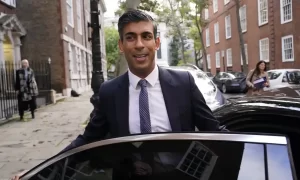The UK Government is presently under severe criticism for its alleged lethargic approach in recouping the colossal sum of over £1 billion, erroneously disbursed or defrauded during the Covid pandemic business grants.
This scrutiny comes amidst revelations that a meagre £20.9 million, a paltry 2% of the estimated total, has been reclaimed thus far.
MPs), particularly those associated with the influential Public Accounts Committee (PAC), have berated the Government for its tardy reaction to the issue. Despite assurances by then-Chancellor, Rishi Sunak, that the losses would not be overlooked, the current scenario paints a contrasting picture.
“The Government must not wait for the conclusions of the Covid inquiry to learn the lessons laid out in this report. Never again should a national emergency find policy being written as we go along, without firm planning and good local data, with local authorities not properly funded to work in partnership on the support required.” – Meg Hillier, chair of the PAC
The emergency funds were primarily aimed at aiding millions of businesses to stay afloat during the pandemic restrictions. The Government’s payout through these schemes totalled a staggering £22.6 billion. The beneficiaries of these grants were mostly businesses in sectors such as retail, hospitality, tourism, and events, which were significantly impacted by the pandemic-induced restrictions.
Local authorities, under the directions of the ministers, were tasked with the responsibility of dispensing the cash support to businesses in their regions. However, the MPs discovered that these local authorities were themselves grappling with financial strains, making it challenging to fulfil the objectives.
The PAC report highlighted that the Government, while setting up the schemes, was cognizant that due to insufficient information about the recipients, some businesses would end up receiving excessive support, while others would be inadequately funded. The National Audit Office discovered that the initial schemes were launched hastily, disbursing vast sums of money with minimal preparation.
This lack of preparedness and foresight led to Treasury minister Lord Agnew resigning due to the improper arrangements to prevent fraud. The report also lamented that the central government’s detachment from the practical realities on the ground resulted in confusion, delays, and uncertainty for small businesses and local authorities.
The Government’s perceived inaction has led to MPs demanding that the ministers outline the specific measures they intend to take to recover the funds and restore public trust. The MPs argue that the Government cannot merely give up on recouping the lost money on the grounds of the process being cumbersome.
The Department for Business and Trade (DBT) officials contend that scrutinising payments is highly expensive and that there exist legal ambiguities concerning their ability to reclaim some payments. This complexity, they argue, makes it extremely difficult to recover a significant portion of the losses.
As the nation awaits the Government’s response to these allegations, it is clear that this incident has highlighted the need for a more rigorous preparation for any future emergencies. The Government needs to be armed with a comprehensive understanding of how best to support businesses during challenging times.
The DBT responded to the allegations by stating that they are working in conjunction with local authorities to recover payments made to businesses that were ineligible for the grant scheme. They claimed to have already recovered nearly £33 million and an additional £4 billion of taxpayers’ money held by local authorities. They also emphasised their decisive action to recoup more than £12 million linked to fraudulent Covid-19 bounce back loan scheme applications.
As the debate around this issue continues, the need for greater transparency and accountability in government spending becomes increasingly apparent. It remains to be seen how the Government will address these concerns and what steps will be taken to prevent such issues in the future.
Read more:
The Pandemic Business Grants Scandal: A Door Left Ajar for Fraudsters?


























